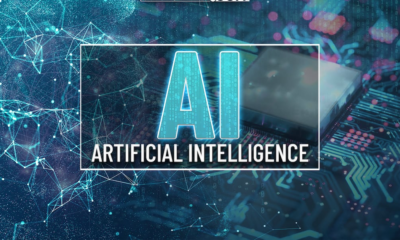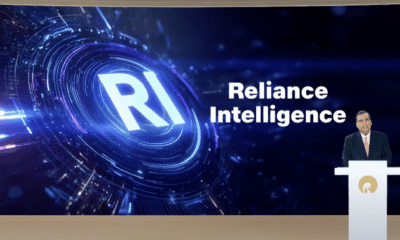Tools & Platforms
Meta partners with Midjourney on AI image and video models

Meta is partnering with Midjourney to license the startup’s AI image and video generation technology, Meta Chief AI Officer Alexandr Wang announced Friday in a post on Threads. Wang says Meta’s research teams will collaborate with Midjourney to bring its technology into future AI models and products.
“To ensure Meta is able to deliver the best possible products for people it will require taking an all-of-the-above approach,” Wang said. “This means world-class talent, ambitious compute roadmap, and working with the best players across the industry.”
The Midjourney partnership could help Meta develop products that compete with industry-leading AI image and video models, such as OpenAI’s Sora, Black Forest Lab’s Flux, and Google’s Veo. Last year, Meta rolled out its own AI image generation tool, Imagine, into several of its products, including Facebook, Instagram, and Messenger. Meta also has an AI video generation tool, Movie Gen, that allows users to create videos from prompts.
The licensing agreement with Midjourney marks Meta’s latest deal to get ahead in the AI race. Earlier this year, CEO Mark Zuckerberg went on a hiring spree for AI talent, offering some researchers compensation packages worth upwards of $100 million. The social media giant also invested $14 billion in Scale AI, and acquired the AI voice startup, Play AI.
Meta has held talks with several other leading AI labs about other acquisitions, and Zuckerberg even spoke with Elon Musk about joining his $97 billion takeover bid of OpenAI (Meta ultimately did not join the offer, and OpenAI denied Musk’s bid).
While the terms of Meta’s deal with Midjourney remain unknown, the startup’s CEO, David Holz, said in a post on X that his company remains independent with no investors; Midjourney is one of the few leading AI model developers that has never taken on outside funding. At one point, Meta talked with Midjourney about acquiring the startup, according to Upstarts Media.
Midjourney was co-founded in 2022 and quickly became a leader in the AI image generation space for its realistic, unique style. By 2023, the startup was reportedly on pace to generate $200 million in revenue. The startup sells subscriptions starting at $10 per month. It offers pricier tiers, which offer more AI image generations, that cost as much as $120 per month. In June, the startup released its first AI video model, V1.
Techcrunch event
San Francisco
|
October 27-29, 2025
Meta’s partnership with Midjourney comes just two months after the startup was sued by Disney and Universal, alleging that it trained AI image models on copyrighted works. Several AI model developers — including Meta — face similar allegations from copyright holders, however, recent court cases pertaining to AI training data have sided with tech companies.
Tools & Platforms
Your browser is not supported
azcentral.com wants to ensure the best experience for all of our readers, so we built our site to take advantage of the latest technology, making it faster and easier to use.
Unfortunately, your browser is not supported. Please download one of these browsers for the best experience on azcentral.com
Tools & Platforms
Maritime Networks Show Boards How To Navigate AI Governance

From Sails to Servers
Solange Charas, PhD, HCMoneyball
When boards grapple with AI governance today, they often feel they’re navigating uncharted waters. But we’ve sailed these seas before. Five centuries ago, maritime networks created the world’s first global information superhighway, transforming how value was created, managed, and measured. The governance lessons from that era offer a strategic blueprint for today’s C-suite leaders managing AI transformation. As Forbes has noted, boards must navigate AI governance in an uncertain regulatory environment, making historical precedents increasingly valuable.
Between 1400 and 1700, maritime innovations didn’t just change transportation—they fundamentally reshaped business models, workforce development, and financial systems. The parallels to today’s AI revolution are striking, and the governance implications are clear: organizations that treat AI as merely a technology deployment will miss the strategic transformation it demands.
The Original Platform Economy: Governance Lessons from Maritime Networks
Modern boards often view AI through the lens of operational efficiency. History suggests this misses the point entirely. The Dutch East India Company (VOC), founded in 1602, understood that maritime technology wasn’t just about better ships—it was about creating entirely new organizational structures.
The VOC pioneered what we’d now recognize as platform governance: standardized global processes, the world’s first modern stock exchange for capital formation, complex multi-continental logistics networks, and hybrid workforce models that mixed employees with contractors. Most importantly, they created compensation structures that aligned individual performance with enterprise returns—paying workers modest wages plus profit shares.
This wasn’t just innovative management; it was strategic governance that recognized foundational technology requires fundamental changes to how organizations create and capture value. Today’s boards face an identical challenge with AI.
Human Capital as Strategic Asset: Then and Now
The maritime revolution created entirely new professional categories that hadn’t existed before: navigators who mastered complex mathematical calculations, cartographers who combined technical precision with creative insight, and insurance underwriters who developed sophisticated risk assessment capabilities.
Traditional roles didn’t disappear—they evolved. Local traders expanded their capabilities to operate globally. Ship captains transitioned from operational roles to complex management positions overseeing intercontinental operations. Craftsmen upskilled to work with new materials and production methods.
The key insight for today’s CHROs and CFOs: successful maritime powers invested systematically in workforce transformation. Spain’s Casa de Contratación created standardized navigator certification programs—perhaps history’s first technical bootcamp. Maritime academies proliferated across Europe, teaching navigation, cartography, and global commerce.
This systematic approach to skills development wasn’t a cost center—it was a strategic investment that enabled competitive advantage. The same principle applies to AI transformation today. As Forbes has highlighted, human capital is the ultimate differentiator in technological transformations.
Financial Governance: Measuring Maritime ROI vs. AI ROI
The governance challenge boards face with AI mirrors what maritime-era leaders confronted: how do you measure returns on transformational technology?
Historical data reveals striking patterns:
- Trade volumes increased tenfold between 1400-1700
- Spice prices in European markets dropped 70% due to transportation efficiency
- Port cities like Amsterdam experienced 400% population growth
- Specialist navigators earned wage premiums of 3-4x typical artisan compensation
Today’s AI metrics show remarkably similar patterns:
- McKinsey reports AI can drive 23% average productivity improvements
- AI specialists command 35-50% wage premiums above traditional technical roles
- Organizations implementing AI systematically see measurable improvements in operational efficiency and revenue growth
The critical governance lesson: early adopters rarely dominate technological revolutions. Systematic adapters do. AI implementation success comes from systematic approaches, not speed. The Portuguese developed superior maritime technology first, but the Dutch built superior organizational systems around that technology and ultimately dominated global trade. AI implementation success comes from systematic approaches not speed!
Three Governance Imperatives for AI Leadership
Maritime history reveals three essential governance principles that apply directly to AI transformation:
1. Ecosystem Investment Over Technology Investment
Maritime success required more than better ships. It demanded navigation schools, financing mechanisms, legal frameworks, and insurance markets. Similarly, successful AI implementation requires governance ecosystems: training programs, ethical frameworks, data infrastructure, and risk management protocols.
Boards must ask: Are we building AI capability or AI ecosystems? The former leads to pilot projects that don’t scale. The latter creates sustainable competitive advantage.
2. Balanced Risk Management
Thriving maritime nations balanced protection of existing industries with incentives for innovation. England’s Navigation Acts protected domestic shipping while encouraging new ventures. Dutch financial innovations managed risk while enabling new business models.
Today’s boards need similar balanced approaches to AI policy. This means establishing governance frameworks that both protect against algorithmic bias and legal exposure while enabling workforce augmentation and operational innovation.
3. Systematic Human Capital Development
The most successful maritime powers created formal institutions for skills development. They recognized that technological advantage comes from human capability, not just technical capability.
CHROs and boards must treat AI literacy as a strategic imperative, not a training afterthought. This means creating systematic development programs, tracking human capital ROI alongside AI ROI, and ensuring that workforce transformation supports rather than undermines organizational resilience.
Measuring What Matters: Human Capital ROI in the AI Era
The SEC’s enhanced human capital disclosure requirements under Reg S-K Item 101(c) reflect growing recognition that workforce strategy is material to enterprise value. Maritime-era governance offers a template: track both technological adoption and human adaptation with equal rigor.
Key metrics should include:
- AI-human collaboration effectiveness, not just automation rates
- Internal mobility and reskilling success rates
- Innovation pipeline strength as AI augments human creativity
- Employee engagement and retention during technological transition
These aren’t “soft” HR metrics—they’re predictive indicators of sustainable competitive advantage.
The Governance Imperative: Leadership in Transformation
History’s lesson is unambiguous: technological revolutions reward systematic adapters, not early adopters. The Portuguese pioneered maritime technology but the Dutch mastered maritime governance.
For today’s boards, this means treating AI not as an IT project but as a governance challenge that spans strategy, finance, and human capital. Success requires CHROs and CFOs working in concert to ensure AI enhances rather than erodes organizational capability.
The organizations that emerge stronger from AI transformation will be those that remember what maritime history teaches: technology alone never changes the world. People, institutions, and governance do.
Author Note: This column builds on collaborative research with Stela Lupushor examining historical patterns in technological transformation and their implications for modern workforce strategy.
Tools & Platforms
Your browser is not supported
northjersey.com wants to ensure the best experience for all of our readers, so we built our site to take advantage of the latest technology, making it faster and easier to use.
Unfortunately, your browser is not supported. Please download one of these browsers for the best experience on northjersey.com
-
Tools & Platforms3 weeks ago
Building Trust in Military AI Starts with Opening the Black Box – War on the Rocks
-

 Business2 days ago
Business2 days agoThe Guardian view on Trump and the Fed: independence is no substitute for accountability | Editorial
-

 Ethics & Policy1 month ago
Ethics & Policy1 month agoSDAIA Supports Saudi Arabia’s Leadership in Shaping Global AI Ethics, Policy, and Research – وكالة الأنباء السعودية
-

 Events & Conferences3 months ago
Events & Conferences3 months agoJourney to 1000 models: Scaling Instagram’s recommendation system
-

 Jobs & Careers2 months ago
Jobs & Careers2 months agoMumbai-based Perplexity Alternative Has 60k+ Users Without Funding
-

 Funding & Business2 months ago
Funding & Business2 months agoKayak and Expedia race to build AI travel agents that turn social posts into itineraries
-

 Education2 months ago
Education2 months agoVEX Robotics launches AI-powered classroom robotics system
-

 Podcasts & Talks2 months ago
Podcasts & Talks2 months agoHappy 4th of July! 🎆 Made with Veo 3 in Gemini
-

 Podcasts & Talks2 months ago
Podcasts & Talks2 months agoOpenAI 🤝 @teamganassi
-

 Mergers & Acquisitions2 months ago
Mergers & Acquisitions2 months agoDonald Trump suggests US government review subsidies to Elon Musk’s companies



















